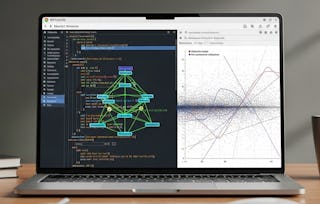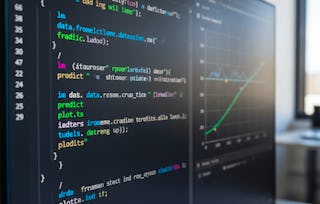By the end of this course, learners will be able to identify machine learning foundations, apply statistical concepts, evaluate probability distributions, and implement core algorithms in R. Participants will gain practical skills in data manipulation, regression, classification, decision trees, and ensemble learning, building a comprehensive understanding of both theory and application.

Machine Learning with R: Build, Analyze & Predict

Machine Learning with R: Build, Analyze & Predict
This course is part of AI Machine Learning with R & Python Projects Specialization

Instructor: EDUCBA
Included with
15 reviews
What you'll learn
Apply ML foundations, probability, and statistical concepts in R.
Implement regression, classification, and decision tree models.
Use ensemble methods like random forests and boosting in R.
Skills you'll gain
- Decision Tree Learning
- Data Analysis
- Supervised Learning
- Random Forest Algorithm
- Probability Distribution
- Classification Algorithms
- R Programming
- Statistical Modeling
- Statistical Inference
- Model Evaluation
- Statistical Analysis
- Data Manipulation
- Exploratory Data Analysis
- Regression Analysis
- Machine Learning
- Skills section collapsed. Showing 9 of 15 skills.
Details to know

Add to your LinkedIn profile
October 2025
13 assignments
See how employees at top companies are mastering in-demand skills

Build your subject-matter expertise
- Learn new concepts from industry experts
- Gain a foundational understanding of a subject or tool
- Develop job-relevant skills with hands-on projects
- Earn a shareable career certificate

There are 4 modules in this course
This module introduces the foundations of Machine Learning and the R programming environment. Learners will explore the key concepts of supervised and unsupervised learning, regression versus classification, and the practical steps to apply machine learning to real-world problems. In addition, the module covers essential R programming skills for data manipulation, vector operations, and dataset preparation, ensuring a strong foundation for statistical and machine learning tasks.
What's included
10 videos3 assignments
This module covers statistical concepts essential for building and interpreting machine learning models. Learners will review core measures such as variance, correlation, R-squared, and standard error while identifying common statistical mistakes. The module also extends to advanced topics including linear regression, statistical assumptions, and interpretation of outputs, equipping learners with the ability to analyze data with confidence.
What's included
12 videos3 assignments
This module focuses on probability distributions and hypothesis testing, both critical to statistical inference. Learners will examine discrete and continuous probability distributions, variance-covariance structures, and hypothesis rejection criteria. The module also introduces classical distributions such as t, chi-square, and Poisson, along with visualization techniques for testing data assumptions and interpreting results.
What's included
12 videos3 assignments
This module introduces core machine learning algorithms, focusing on regression, classification, decision trees, and ensemble methods. Learners will explore K-Nearest Neighbors (KNN), generalized regression models, decision tree classifiers, and the use of pruning to improve performance. The module concludes with ensemble learning techniques, including random forests and boosting, for building powerful predictive models.
What's included
17 videos4 assignments
Earn a career certificate
Add this credential to your LinkedIn profile, resume, or CV. Share it on social media and in your performance review.
Explore more from Machine Learning
 Status: Free Trial
Status: Free Trial Status: Preview
Status: Preview
Why people choose Coursera for their career

Felipe M.

Jennifer J.

Larry W.

Chaitanya A.
Learner reviews
- 5 stars
60%
- 4 stars
33.33%
- 3 stars
6.66%
- 2 stars
0%
- 1 star
0%
Showing 3 of 15
Reviewed on Dec 30, 2025
This course delivers a clear understanding of machine learning algorithms and their practical implementation using R, boosting analytical and predictive confidence.
Reviewed on Jan 1, 2026
The perfect blend of statistical depth and practical R mastery. I learned techniques I haven't seen covered properly anywhere else.
Reviewed on Jan 5, 2026
I was genuinely impressed by the depth and polish of this course. Modern R ecosystem coverage, thoughtful model comparison, and excellent business-oriented explanations.

Open new doors with Coursera Plus
Unlimited access to 10,000+ world-class courses, hands-on projects, and job-ready certificate programs - all included in your subscription
Advance your career with an online degree
Earn a degree from world-class universities - 100% online
Join over 3,400 global companies that choose Coursera for Business
Upskill your employees to excel in the digital economy
Frequently asked questions
To access the course materials, assignments and to earn a Certificate, you will need to purchase the Certificate experience when you enroll in a course. You can try a Free Trial instead, or apply for Financial Aid. The course may offer 'Full Course, No Certificate' instead. This option lets you see all course materials, submit required assessments, and get a final grade. This also means that you will not be able to purchase a Certificate experience.
When you enroll in the course, you get access to all of the courses in the Specialization, and you earn a certificate when you complete the work. Your electronic Certificate will be added to your Accomplishments page - from there, you can print your Certificate or add it to your LinkedIn profile.
Yes. In select learning programs, you can apply for financial aid or a scholarship if you can’t afford the enrollment fee. If fin aid or scholarship is available for your learning program selection, you’ll find a link to apply on the description page.
More questions
Financial aid available,



